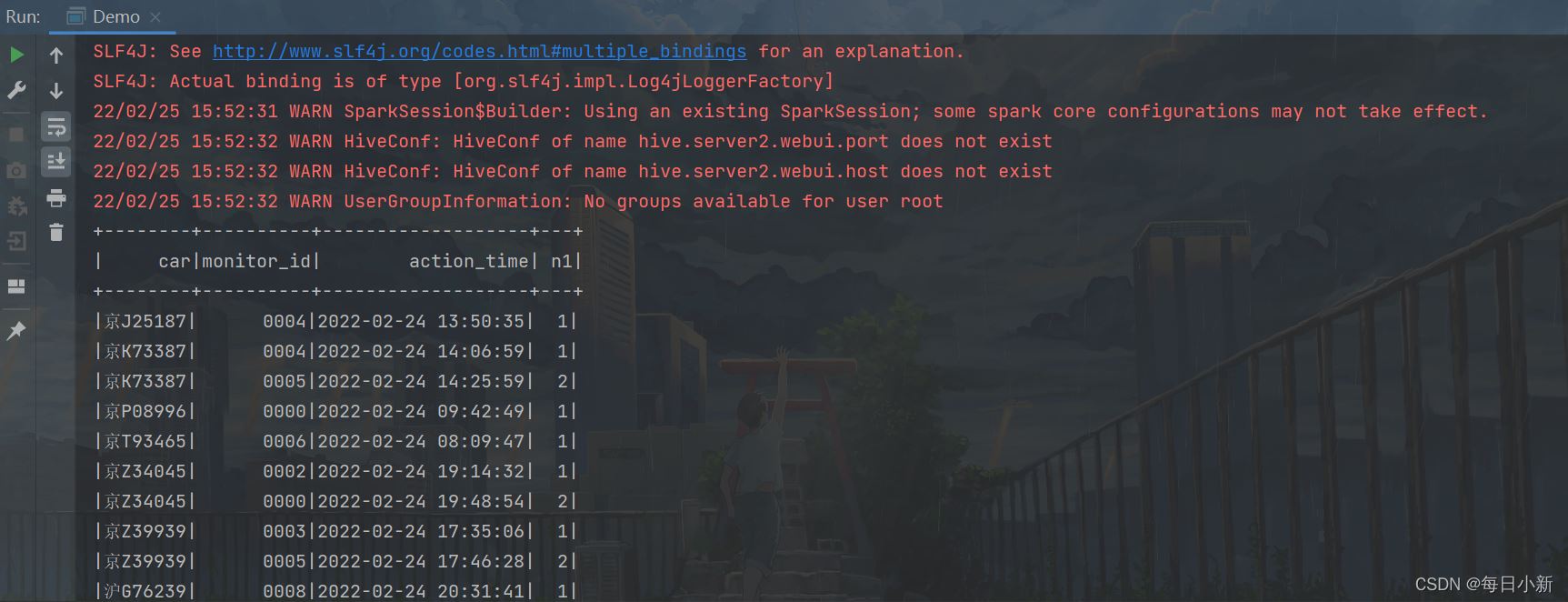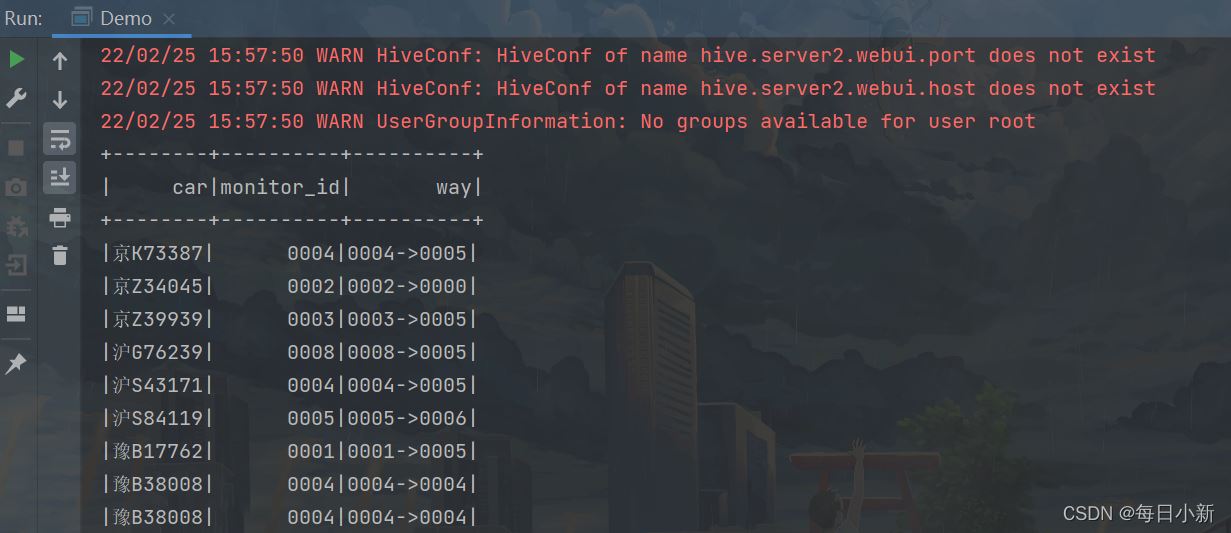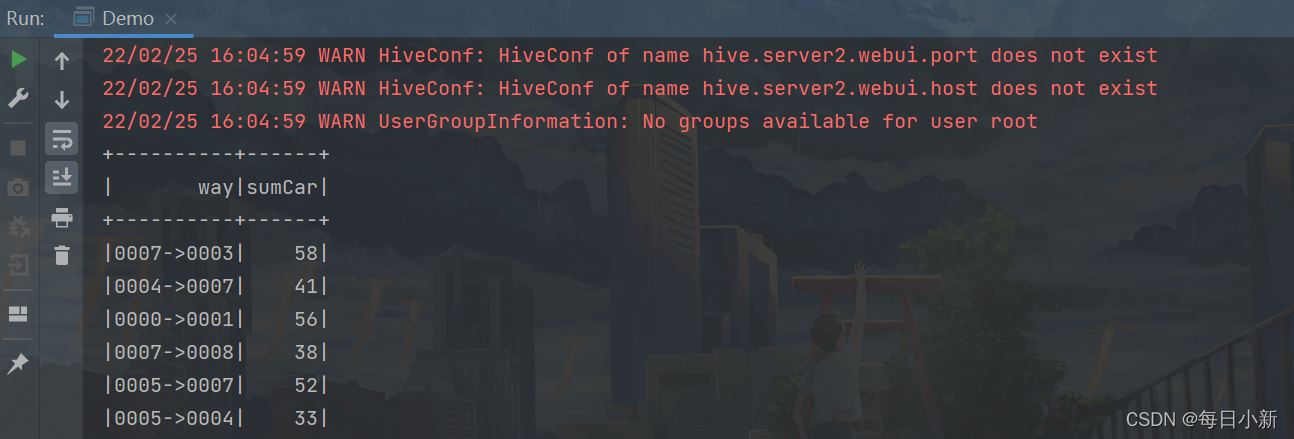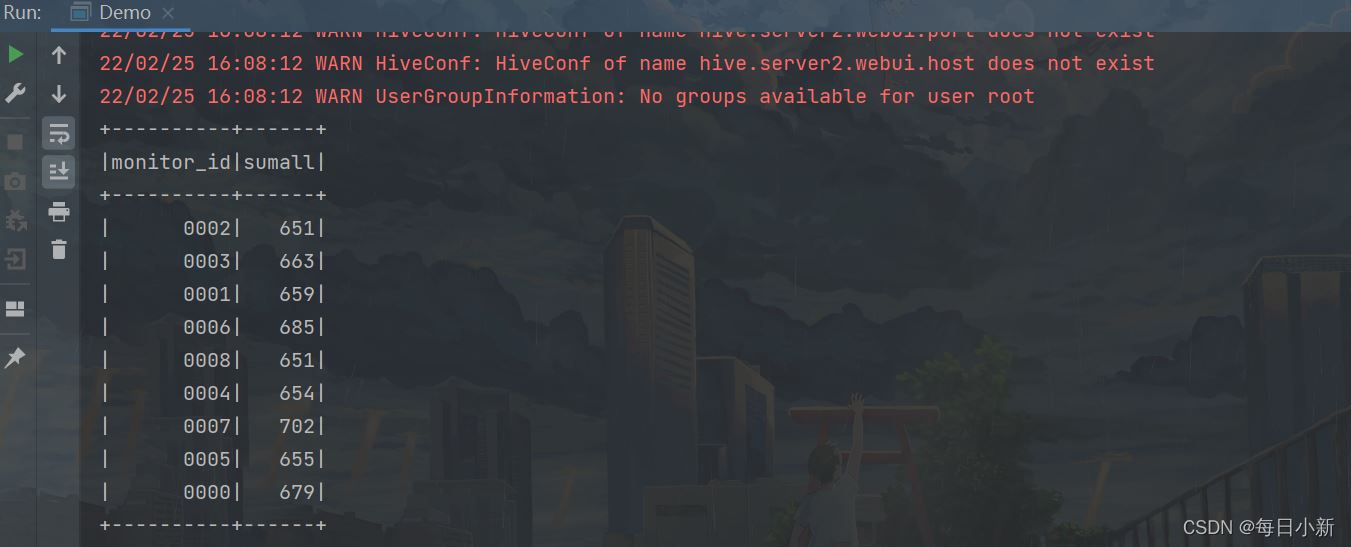SQL开发:使用SQL实现车流量的计算的示例代码
卡口转换率
将数据导入hive,通过SparkSql编写sql,实现不同业务的数据计算实现,主要讲述车辆卡口转换率,卡口转化率:主要计算不同卡口下车辆之间的流向,求出之间的转换率。
将数据导入hive,通过SparkSql编写sql,实现不同业务的数据计算实现,主要讲述车辆卡口转换率,卡口转化率:主要计算不同卡口下车辆之间的流向,求出之间的转换率。

1、查出每个地区下每个路段下的车流量
select
car,
monitor_id,
action_time,
ROW_NUMBER () OVER (PARTITION by car
ORDER by
action_time) as n1
FROM
traffic.hive_flow_action
car,
monitor_id,
action_time,
ROW_NUMBER () OVER (PARTITION by car
ORDER by
action_time) as n1
FROM
traffic.hive_flow_action
此结果做为表1,方便后面错位连接使用

2、通过错位连接获取每辆车的行车记录
通过表1的结果,与自身进行错位链接,并以车牌为分区,拼接经过卡口的过程
(select
t1.car,
t1.monitor_id,
concat(t1.monitor_id,
“->”,
t2.monitor_id) as way
from
(
select
car,
monitor_id,
action_time,
ROW_NUMBER () OVER (PARTITION by car
ORDER by
action_time) as n1
FROM
traffic.hive_flow_action) t1
left join (
select
car,
monitor_id,
action_time,
ROW_NUMBER () OVER (PARTITION by car
ORDER by
action_time) as n1
FROM
traffic.hive_flow_action) t2 on
t1.car = t2.car
and t1.n1 = t2.n1-1
where
t2.action_time is not null)
t1.car,
t1.monitor_id,
concat(t1.monitor_id,
“->”,
t2.monitor_id) as way
from
(
select
car,
monitor_id,
action_time,
ROW_NUMBER () OVER (PARTITION by car
ORDER by
action_time) as n1
FROM
traffic.hive_flow_action) t1
left join (
select
car,
monitor_id,
action_time,
ROW_NUMBER () OVER (PARTITION by car
ORDER by
action_time) as n1
FROM
traffic.hive_flow_action) t2 on
t1.car = t2.car
and t1.n1 = t2.n1-1
where
t2.action_time is not null)

获取到每辆车的一个行车记录,经过的卡口
3、获取行车过程中的车辆数
获取卡口1~卡口2,…等的车辆数有哪些,即拿上面的行车记录字段进行分区在进行统计
(select
s1.way,
COUNT(1) sumCar
from
–行车过程
(select
t1.car,
t1.monitor_id,
concat(t1.monitor_id,
“->”,
t2.monitor_id) as way
from
(
select
car,
monitor_id,
action_time,
ROW_NUMBER () OVER (PARTITION by car
ORDER by
action_time) as n1
FROM
traffic.hive_flow_action) t1
left join (
select
car,
monitor_id,
action_time,
ROW_NUMBER () OVER (PARTITION by car
ORDER by
action_time) as n1
FROM
traffic.hive_flow_action) t2 on
t1.car = t2.car
and t1.n1 = t2.n1-1
where
t2.action_time is not null)s1
group by way)
s1.way,
COUNT(1) sumCar
from
–行车过程
(select
t1.car,
t1.monitor_id,
concat(t1.monitor_id,
“->”,
t2.monitor_id) as way
from
(
select
car,
monitor_id,
action_time,
ROW_NUMBER () OVER (PARTITION by car
ORDER by
action_time) as n1
FROM
traffic.hive_flow_action) t1
left join (
select
car,
monitor_id,
action_time,
ROW_NUMBER () OVER (PARTITION by car
ORDER by
action_time) as n1
FROM
traffic.hive_flow_action) t2 on
t1.car = t2.car
and t1.n1 = t2.n1-1
where
t2.action_time is not null)s1
group by way)

4、获取每个卡口的总车辆数
获取每个卡口最初的车辆数,方便后面拿行车轨迹车辆数/总车辆数,得出卡口之间的转换率
select
monitor_id ,
COUNT(1) sumall
from
traffic.hive_flow_action
group by
monitor_id
monitor_id ,
COUNT(1) sumall
from
traffic.hive_flow_action
group by
monitor_id

5、求出卡口之间的转换率
select
s2.way,
s2.sumCar / s3.sumall zhl
from
(
select
s1.way,
COUNT(1) sumCar
from
–行车过程
(
select
t1.car,
t1.monitor_id,
concat(t1.monitor_id,
“->”,
t2.monitor_id) as way
from
(
select
car,
monitor_id,
action_time,
ROW_NUMBER () OVER (PARTITION by car
ORDER by
action_time) as n1
FROM
traffic.hive_flow_action) t1
left join (
select
car,
monitor_id,
action_time,
ROW_NUMBER () OVER (PARTITION by car
ORDER by
action_time) as n1
FROM
traffic.hive_flow_action) t2 on
t1.car = t2.car
and t1.n1 = t2.n1-1
where
t2.action_time is not null)s1
group by
way)s2
left join
–每个卡口总车数
(
select
monitor_id ,
COUNT(1) sumall
from
traffic.hive_flow_action
group by
monitor_id) s3 on
split(s2.way,
“->”)[0]= s3.monitor_id
s2.way,
s2.sumCar / s3.sumall zhl
from
(
select
s1.way,
COUNT(1) sumCar
from
–行车过程
(
select
t1.car,
t1.monitor_id,
concat(t1.monitor_id,
“->”,
t2.monitor_id) as way
from
(
select
car,
monitor_id,
action_time,
ROW_NUMBER () OVER (PARTITION by car
ORDER by
action_time) as n1
FROM
traffic.hive_flow_action) t1
left join (
select
car,
monitor_id,
action_time,
ROW_NUMBER () OVER (PARTITION by car
ORDER by
action_time) as n1
FROM
traffic.hive_flow_action) t2 on
t1.car = t2.car
and t1.n1 = t2.n1-1
where
t2.action_time is not null)s1
group by
way)s2
left join
–每个卡口总车数
(
select
monitor_id ,
COUNT(1) sumall
from
traffic.hive_flow_action
group by
monitor_id) s3 on
split(s2.way,
“->”)[0]= s3.monitor_id


